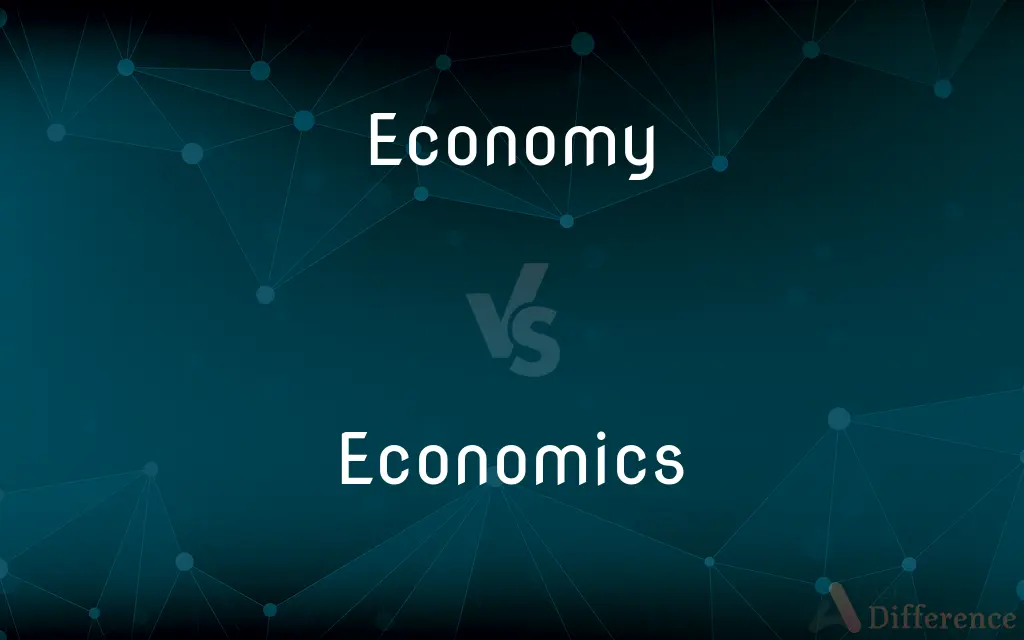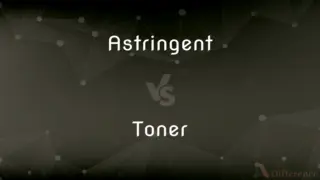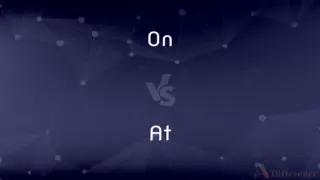Economy vs. Economics — What's the Difference?
By Tayyaba Rehman — Updated on October 31, 2023
The economy refers to a system of production and consumption, while economics is the study of how economies work.

Difference Between Economy and Economics
Table of Contents
ADVERTISEMENT
Key Differences
An economy encompasses all activities related to production, distribution, and consumption of goods and services in a specific area. It includes businesses, markets, and trade activities within a country or region. The economy is a tangible entity that can be observed and measured.
Economics, however, is an academic discipline. It involves the study of how societies allocate scarce resources. Economics employs theories and models to understand economic phenomena. It's a field of study, not a physical entity.
The economy is affected by various factors like government policies, market trends, and international trade. It reflects the overall health of a financial system, often measured through indicators like GDP and employment rates. The economy is dynamic and changes in response to numerous factors.
In contrast, economics provides tools to analyze and interpret these changes. It delves into concepts like supply and demand, inflation, and fiscal policies. Economics aims to explain how economies function and how economic agents interact.
When discussing the economy, one might refer to the ‘global economy’ or the ‘U.S. economy’. These terms point to real, operational systems that involve financial transactions and economic activities.
ADVERTISEMENT
Conversely, when discussing economics, it’s about the study, theories, and principles that explain how these economies operate. Economics includes branches like microeconomics and macroeconomics, each focusing on different scales of economic activity.
Comparison Chart
Definition
A system of production, distribution, and consumption of goods and services.
The study of how economies operate and how resources are allocated.
Nature
Tangible, can be observed and measured.
Academic, theoretical, and analytical.
Focus
Specific areas, countries, or global systems.
Principles, theories, and models.
Measurement
Measured through GDP, employment rates, etc.
Not measured; instead, it provides frameworks for analysis.
Examples
The U.S. economy, global economy.
Microeconomics, macroeconomics.
Compare with Definitions
Economy
The economy is the organized financial system of a country.
The U.S. economy showed strong growth last quarter.
Economics
It’s the theoretical study of financial systems and markets.
Economics provides models to predict consumer behavior.
Economy
It’s the management of resources for production and consumption.
Efficient resource management is vital for a sustainable economy.
Economics
It’s an academic discipline analyzing economic activities.
His research in economics focused on inflation trends.
Economy
The economy includes all market activities within a region.
The local economy thrives due to its vibrant tech industry.
Economics
Economics is a social science studying resource allocation.
She chose to study economics to understand market behaviors.
Economy
An economy (from Greek οίκος – "household" and νέμoμαι – "manage") is an area of the production, distribution and trade, as well as consumption of goods and services by different agents. In general, it is defined 'as a social domain that emphasize the practices, discourses, and material expressions associated with the production, use, and management of resources'.
Economics
Economics involves principles and theories about economies.
Supply and demand is a fundamental concept in economics.
Economy
Careful, thrifty management of resources, such as money, materials, or labor
Learned to practice economy in making out the household budget.
Economics
Economics aids in formulating economic policies.
The government used economics to design the new tax policy.
Economy
An example or result of such management; a saving.
Economics
Economics () is the social science that studies how people interact with value; in particular, the production, distribution, and consumption of goods and services.Economics focuses on the behaviour and interactions of economic agents and how economies work. Microeconomics analyzes basic elements in the economy, including individual agents and markets, their interactions, and the outcomes of interactions.
Economy
The system or range of economic activity in a country, region, or community
Effects of inflation were felt at every level of the economy.
Economics
(used with a sing. verb) The social science that deals with the production, distribution, and consumption of goods and services and with the theory and management of economies or economic systems.
Economy
A specific type of economic system
An industrial economy.
A planned economy.
Economics
(used with a sing. or pl. verb) Economic matters, especially relevant financial considerations
"Economics are slowly killing the family farm" (Christian Science Monitor).
Economy
An orderly, functional arrangement of parts; an organized system
"the sense that there is a moral economy in the world, that good is rewarded and evil is punished" (George F. Will).
Economics
(social sciences) The study of resource allocation, distribution and consumption; of capital and investment; and of management of the factors of production.
Mary studied economics for 5 years before going into banking.
Economy
Efficient, sparing, or conservative use
Wrote with an economy of language.
Economics
The science of household affairs, or of domestic management.
Economy
The least expensive class of accommodations, especially on a commercial conveyance, such as an airplane.
Economics
Political economy; the science of the utilities or the useful application of wealth or material resources; the study of the production, distribution, and consumption of goods and services of a nation or region, and its effect on the wealth of a country. See Political economy, under Political.
Economy
(Theology) The method of God's government of and activity within the world.
Economics
The branch of social science that deals with the production and distribution and consumption of goods and services and their management
Economy
Economical or inexpensive to buy or use
An economy car.
An economy motel.
Economy
Effective management of a community or system, or especially its resources.
Economy
The regular operation of nature in the generation, nutrition and preservation of animals or plants.
Animal economy, vegetable economy
Economy
System of management; general regulation and disposition of the affairs of a state or nation, or of any department of government.
Economy
A system of rules, regulations, rites and ceremonies.
The Jewish economy
Economy
The disposition or arrangement of any work.
The economy of a poem
Economy
The study of money, currency and trade, and the efficient use of resources.
Economy
Frugal use of resources.
Economy of word
Economy
The system of production and distribution and consumption. The overall measure of a currency system; as the national economy.
Economy
(theology) The method of divine government of the world. (See w:Economy (religion).)
Economy
(US) The part of a commercial passenger airplane or train reserved for those paying the lower standard fares; economy class.
Economy
(archaic) Management of one’s residency.
Economy
Cheap to run; using minimal resources; representing good value for money; economical.
He bought an economy car.
Economy size.
Economy
(US) In or via the part of a commercial passenger airplane reserved for those paying the lower standard fares.
Economy
The management of domestic affairs; the regulation and government of household matters; especially as they concern expense or disbursement; as, a careful economy.
Himself busy in charge of the household economies.
Economy
Orderly arrangement and management of the internal affairs of a state or of any establishment kept up by production and consumption; esp., such management as directly concerns wealth; as, political economy.
Economy
The system of rules and regulations by which anything is managed; orderly system of regulating the distribution and uses of parts, conceived as the result of wise and economical adaptation in the author, whether human or divine; as, the animal or vegetable economy; the economy of a poem; the Jewish economy.
The position which they [the verb and adjective] hold in the general economy of language.
In the Greek poets, as also in Plautus, we shall see the economy . . . of poems better observed than in Terence.
The Jews already had a Sabbath, which, as citizens and subjects of that economy, they were obliged to keep.
Economy
Thrifty and frugal housekeeping; management without loss or waste; frugality in expenditure; prudence and disposition to save; as, a housekeeper accustomed to economy but not to parsimony.
I have no other notion of economy than that it is the parent to liberty and ease.
The father was more given to frugality, and the son to riotousness [luxuriousness].
Economy
The system of production and distribution and consumption
Economy
The efficient use of resources;
Economy of effort
Economy
Frugality in the expenditure of money or resources;
The Scots are famous for their economy
Economy
An act of economizing; reduction in cost;
It was a small economy to walk to work every day
There was a saving of 50 cents
Economy
It refers to the financial state or condition of a country.
The economy is recovering slowly from the recession.
Economy
Economy encompasses trade and commerce activities.
International trade is a key component of the global economy.
Common Curiosities
Can we measure an economy?
Yes, an economy can be measured through indicators like GDP, employment rates, etc.
What’s a sign of a strong economy?
A strong economy often has low unemployment, stable prices, and steady growth.
Can anyone study economics?
Yes, economics is a field open to anyone interested in understanding how economic systems work.
What is an economy?
An economy is a system encompassing all activities related to production, distribution, and consumption in a region.
What does economics study?
Economics studies how societies allocate resources and manage economies.
Does economics offer real-world solutions?
Yes, economics provides frameworks and theories that can guide real-world economic policies and decisions.
How do international relations affect the economy?
International relations can impact trade, investment, and economic stability.
Is economics only about money?
No, economics also covers how resources are used, market behaviors, and policy impacts.
Does the economy impact daily life?
Yes, the state of the economy can significantly impact job markets, prices, and overall quality of life.
How does economics help in policy-making?
Economics provides insights and models that help policymakers design effective economic policies.
What affects an economy?
Factors like government policies, market trends, and global events can affect an economy.
Are there different branches of economics?
Yes, major branches include microeconomics (individuals and firms) and macroeconomics (whole economies).
Is studying economics beneficial for business?
Yes, understanding economics can aid in making informed business decisions and strategies.
What role does technology play in the economy?
Technology can drive innovation, efficiency, and growth in the economy.
Can economic theories change?
Yes, economic theories can evolve as new data and insights emerge.
Share Your Discovery

Previous Comparison
Astringent vs. Toner
Next Comparison
On vs. AtAuthor Spotlight
Written by
Tayyaba RehmanTayyaba Rehman is a distinguished writer, currently serving as a primary contributor to askdifference.com. As a researcher in semantics and etymology, Tayyaba's passion for the complexity of languages and their distinctions has found a perfect home on the platform. Tayyaba delves into the intricacies of language, distinguishing between commonly confused words and phrases, thereby providing clarity for readers worldwide.















































